
The Lord Mayor of London is the mayor of the City of London, England, and the leader of the City of London Corporation. Within the City, the Lord Mayor is accorded precedence over all individuals except the sovereign and retains various traditional powers, rights, and privileges, including the title and style The Right Honourable Lord Mayor of London.
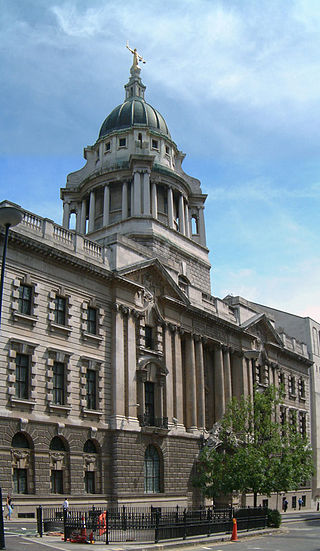
The Central Criminal Court of England and Wales, commonly referred to as the Old Bailey after the street on which it stands, is a criminal court building in central London, one of several that house the Crown Court of England and Wales. The street outside follows the route of the ancient wall around the City of London, which was part of the fortification's bailey, hence the metonymic name.

The Usher of the Black Rod is an official in the parliaments of several countries of the Commonwealth of Nations. The position originates in the House of Lords of the Parliament of the United Kingdom. Equivalent positions also exist in Australia, Canada, and New Zealand.
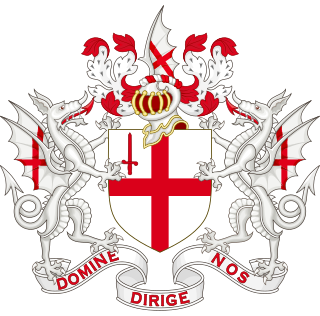
The City of London Corporation, officially and legally the Mayor and Commonalty and Citizens of the City of London, is the municipal governing body of the City of London, the historic centre of London and the location of much of the United Kingdom's financial sector.

Nathaniel Lindley, Baron Lindley, was an English judge.
Two sheriffs are elected annually for the City of London by the Liverymen of the City livery companies. Today's sheriffs have only nominal duties, but the historical officeholders had important judicial responsibilities. They have attended the justices at the Central Criminal Court, Old Bailey, since its original role as the court for the City and Middlesex.
The Recorder of London is an ancient legal office in the City of London. The Recorder of London is the senior circuit judge at the Central Criminal Court, hearing trials of criminal offences. The Recorder is appointed by the Crown on the recommendation of the City of London Corporation with the concurrence of the Lord Chancellor. The Recorder's deputy is the Common Serjeant of London, appointed by the Crown on the recommendation of the Lord Chancellor. The Recorder of London is, since 14 April 2020, Mark Lucraft.

Sir Carl Douglas Aarvold was an English barrister who became Recorder of London. Among other cases, he presided at the 1965 trial of the Kray twins. In his earlier days, he was also an England rugby union international player
The Royal Commission on the Corporation of the City of London was a Royal Commission, established in 1853, which considered the local government arrangements of the City of London and the surrounding metropolitan area.
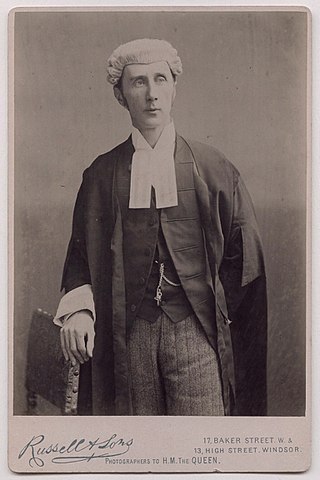
Sir Henry Fielding Dickens, KC was an English barrister, who served as a KC and Common Serjeant of London. He was the eighth of ten children born to English author Charles Dickens and his wife Catherine, and the last surviving child of Dickens.

Brian John Barker is a British retired judge. From February 2013 to January 2015 he served as the Recorder of London, the most senior judge at the Old Bailey. Prior to that he was the Common Serjeant of London, the second most senior judge at the Old Bailey.

Sir William Thomas Charley, KC was a British judge and Conservative Party politician.
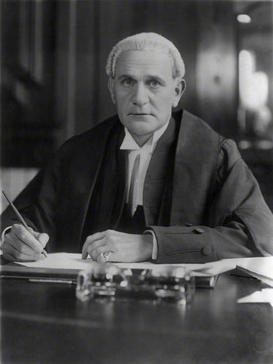
George Cecil Whiteley KC MA DL JP (1875–1942), was Common Serjeant of London from 1933 to 1942 and a Judge at the Mayor's and City of London Court.

Sir Frederick Albert Bosanquet, KC, JP was a British judge who was Common Serjeant of London, the second most senior permanent judge of the Central Criminal Court after the Recorder of London.
Thomas Juvenal was the first known Common Serjeant of London, an ancient British legal office, first recorded with his appointment in 1291, and which is the second most senior permanent judge in London after the Recorder of London, acting as deputy to that office, and sitting as a judge in the trial of criminal offences.

Sir William Pritchard or Prichard (1632?–1705) was an English merchant, slave trader and politician, Lord Mayor of London in 1682.
Sir Nicholas Richard Maybury Hilliard is a British judge who was the Recorder of London, an ancient and senior legal post at the Old Bailey, and before that Common Serjeant of London, the Recorder's second. He was appointed to that office in May 2013. From 6 January 2015 he was Recorder of London, the senior judge at the Old Bailey. In October 2019 it was announced that was to be appointed as a judge of the High Court of Justice. He took up that appointment on 19 November 2019 ceasing to be Recorder of London.

Mr Commissioner Robert Malcolm Kerr LL.D, was a British judge of the late Victorian era.
Sir Hugh Loveday Beazley was a County Court Judge (1934–1937), a Judge of the Mayor's and City of London Court (1937–1942) and the Common Serjeant of London (1942-1953).
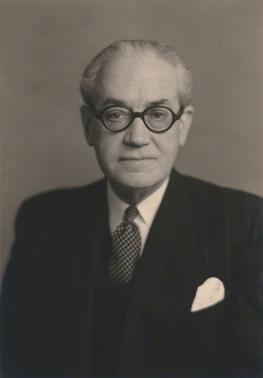
Sir Edward Anthony Hawke was a British judge and the Common Serjeant of London from 1954 to 1959 and Recorder of London from 1959 to 1964.






















